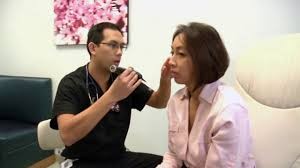 Dear C,
Dear C,
I had a persistent rattling cough that wouldn’t go away and was so exhausted I could barely move. My primary care doctor was on vacation, so I went to an urgent care. The doctor there ordered a chest Xray and blood work, but before I even got the tests done, he tried to prescribe antibiotics, and then Prednisone. When I protested against both due to side effects, he said “no one would take anything if they read all the drug warnings” and sent me away with two kinds of asthma medicine. I don’t have asthma.
I brought the prescriptions home and put them on my shelf. I’ve been looking at them for a week and a half while my cough improved on its own. WTF?
Miss Gruntled
Dear Gruntled,
Is that a question or are you just bitching?
Let’s face it: The whole purpose of urgent care is to provide quick, standard treatments for a limited number of relatively simple problems that might otherwise send a patient to sit in the reception area of a local ER all night. These walk-in medical clinics have their place in crisis intervention. But if you expect personalized, holistic care, you be barkin’ up the wrong tree. What you get at urgent care is wham bam, thank you ma’am, “slap a bandage on it” treatment. If you have a more serious problem, they will refer you to the nearest hospital emergency room.
Urgent care has its pluses and minuses. On the plus side, you don’t have to sit in an ER all night. And you don’t face the prospect of losing your house over a minor case of strep throat. On the minus side, you will probably never see this doctor again, and the attitude that UCs take toward drugs can be somewhat cavalier. If you come in with a slip and fall injury, there is a strong likelihood that the attending physician will dispense Vicodin like M&Ms, without bothering to ask about alcoholism or drug addiction in your past. The idea is to make you feel you have been “treated.” I’ve known urgent care doctors to misread x-rays, overlook allergies and overtreat with antibiotics. However, they are not promising much more. They promise to be friendly. They usually are. They promise to be fast, and they often are (comparatively speaking.) They promise to be cost-effective, and if you weigh their average charge of $155 a visit against the average ER cost of $700, there’s no argument. And let’s be honest — urgent care doesn’t promise to be the Mayo Clinic. So, to a certain extent, I can excuse their generalized indifference to the finer details.
What I have a harder time forgiving are the ERs that charge $700 for the same generalized indifference. “One Pill Fits All“ is pretty much the theme, whether you go to the biggest hospital in the state or the urgent care that sits next to a Taco Bell in a shopping plaza. And most people don’t really ask questions. They want a quick fix, so they take the pills. “The doctor told me to” is a phrase repeated ad nauseum from the mouths of consumers everywhere. But with the number of deaths and injuries from standard medical treatments rising every year, I have to ask: If your doctor told you to jump off a cliff would you do that too?
Many people would. Their health insurance covers it, after all. And what doesn’t it cover? Well, despite the fact that there was great speculation that the new Affordable Care Act would address the need for alternative therapies, neither acupuncture, chiropractic nor any other type of alternative care is available to those with income levels too low to afford co-pays. And the co-pays that accompany additional riders on policies with better coverage are unattractive when compared to standard western treatments.
What is the alternative? Move to a country with social medicine? People in Canada and England bitch about their healthcare too. The problem is, it’s all the same western medicine. If you want coverage for something outside the box, like traditional Chinese medicine or acupuncture, go to Taiwan. A standard health insurance policy for, say, a middle school teacher, costs about $9 a month and covers everything.
My advice to you is to follow the same instincts that led you to shelf your prescription. Remain aware. Don’t ever just take the pills. Do some research. Take care of as many of your own problems as you possibly can. In the United States of America today, it is not safe to close your eyes and sleep. At least, not in a hospital bed.
More Posts by The Author:
Susan Clausen’s Endangered Species
To Be a Friend
What is Love?: Love through the ages
Habits
Advice From The Trenches: Help



